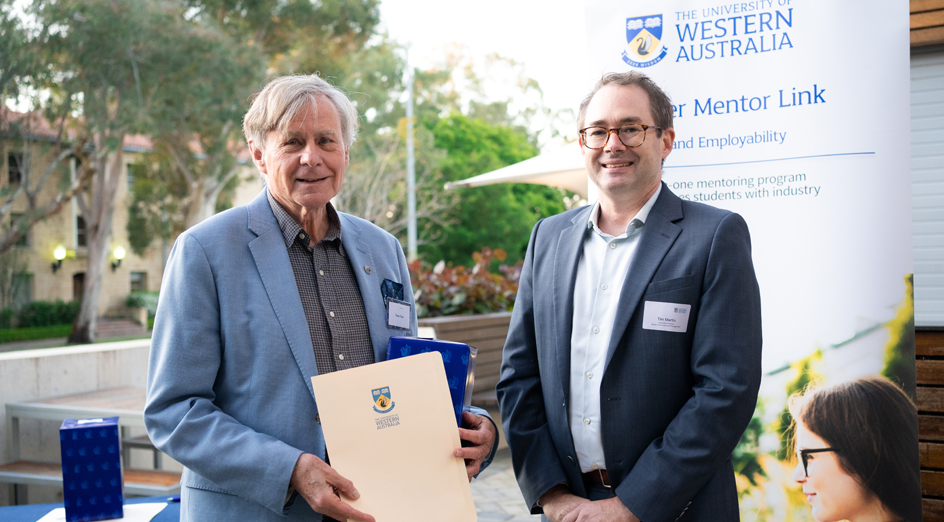As soon as students start at UWA, they are encouraged to build their employability and career awareness. The UWA Careers and Employability Centre helps to build opportunities for students to explore their future, be mentored and learn from industry experts, recognising the importance in gaining real-world experience to road-test potential careers.
From Work Integrated Learning (WIL) to the UWA Innovation Academy, students can engage with their chosen industry to help prepare them for their dream career and long-term goals.
Through the Career Mentor Link program, students are matched with professionals to gain knowledge, guidance and perspective from people with industry experience. The Centre not only facilitates access to a network of like-minded and professional contacts from across the world but also leverages UWA’s extensive industry connections and alumni, to help students gain confidence to pursue their future career.
With extensive experience at linking mentors to students, the Career Mentor Link program has been running for 20 years, with the 2003 pilot program starting with just six mentees and three mentors who have since committed 15 years of their time to the program.
Currently over 20 mentors have spent more than ten years mentoring students. Peter Farr (BE '64, BEc '73) is a long-term volunteer who has been mentoring for 12 years.

Left to right: Peter Farr and Associate Director Student Services and Engagement Tim Martin
“One of the values to me is in giving something back – it keeps me in touch with present-day tertiary students, their courses, their aspirations and knowing that any help given is well appreciated by them and UWA.”
“It’s particularly pleasing to be able to help students obtain vacation work or their first professional employment,” Mr Farr said.
Karen Abbott, the UWA Careers and Employability Manger said having a mentor is one of the best ways of helping students link to industry and prepare for their transition from university to career.
“The program provides a great opportunity for students to gain ‘real-world’ insights and for mentors to share their experiences and their wisdom.
“After experiencing the program, I’m sure that many of our students will decide to become mentors themselves in the future,” she said.
The Medical School’s Clinical Mentoring program has also been running for over 20 years, matching clinical doctors to medical students for the course duration.
As one of the most challenging courses in tertiary education, Mentoring Program Director, Dr Paul McGurgan appreciates that medical students can be challenged by the clinical situations they encounter.
“Alongside guidance and support, students develop professional skills and relationships, as well as professional behaviours,” he said.
“Mentors provide their opinion on their mentee’s progress to ensure students have adequate support, and are developing appropriate professional behaviours and attitudes through completing the relevant year interview record.”
The Dunne family comprise of three Medical School alumni who are all enthusiastic volunteers and contributors to the program.
Dr Michael Dunne (MBBS '16) is currently a 3rd year psychiatry trainee due to begin advanced training in Child and Adolescent Psychiatry in February.
Having had an extremely positive experience of clinical mentoring during medical school, he felt that he wanted to ‘pay it forward’ and apply for the clinical mentoring role.
“I’ve always enjoyed teaching medical students as a doctor on the job, and clinical mentoring allows ongoing support for a medical student outside of clinical placements and directed by the student themselves,” Dr Dunne said.
“The lack of graded marks promotes less of a hierarchical structure between doctor and medical student which can happen in clinical placements.”
Alongside structured assignment feedback, relaxed discussions about medical school and working as a doctor as a whole, Dr Dunne says he is guided by the individual.
This is initially on navigating assignments, rather than towards getting the most out of clinical placements, and finally discussing the process of working as a doctor as they approach graduation.
The role of the mentor is a time honoured practice, giving someone the opportunity to create themselves, generously sharing time, expertise and insights to nurture potential, often personally and professionally.
“Mentors are also typically enthusiastic about their field, and ready to encourage others,” Dr Dunne said.
This can be helpful in the formal meetups, but also having the opportunity to drop a line if the student is struggling, or just seeking advice or a debrief about their experiences.
“It is because of Dr Creagh (MBBS '82, MHPEd '19), my own mentor, that I felt inspired to become a mentor myself, and through the program I aspire to offer as good an experience as I personally had to medical students for years to come.”
If you’re ready to share your wisdom and help someone else discover their full potential, mentoring may be your opportunity.
Find out more about UWA’s Career Mentor Link program here and how to volunteer.
